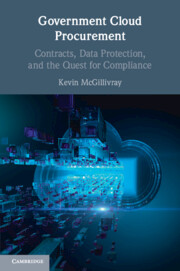Book contents
- Government Cloud Procurement
- Government Cloud Procurement
- Copyright page
- Dedication
- Contents
- Figures
- Tables
- Preface
- Acknowledgements
- Abbreviations
- Part I Subject Matter
- Part II Legal Requirements and Adoption of Government Cloud
- 3 Government Cloud Adoption
- 4 Location Independence, Jurisdiction, and Law Enforcement Access to Cloud Computing Services
- 5 Data Privacy and Data Protection Issues in Cloud Computing
- Part III Private Ordering and Cloud Computing Contracts
- References
- Index
4 - Location Independence, Jurisdiction, and Law Enforcement Access to Cloud Computing Services
from Part II - Legal Requirements and Adoption of Government Cloud
Published online by Cambridge University Press: 10 December 2021
- Government Cloud Procurement
- Government Cloud Procurement
- Copyright page
- Dedication
- Contents
- Figures
- Tables
- Preface
- Acknowledgements
- Abbreviations
- Part I Subject Matter
- Part II Legal Requirements and Adoption of Government Cloud
- 3 Government Cloud Adoption
- 4 Location Independence, Jurisdiction, and Law Enforcement Access to Cloud Computing Services
- 5 Data Privacy and Data Protection Issues in Cloud Computing
- Part III Private Ordering and Cloud Computing Contracts
- References
- Index
Summary
This chapter evaluates the application of jurisdictional principles to cloud computing services and the core challenges for governments and others. The chapter considers the interplay of jurisdiction—the ability of a court to hear a dispute—in the context of physical location, intelligible access to data, and the physical location of servers.
In particular, the chapter focuses on areas of uncertainty, such as the categorization of services and the location of data and limits to current approaches. The chapter argues that the traditional territorial approach to jurisdiction is a poor fit to account for the properties of cloud computing services and data more generally arguing that data poses unique legal challenges to applying traditional jurisdiction principles.
The chapter provides an analysis of access to cloud computing services for law enforcement and intelligence purposes by the US government. This includes an analysis of the “Microsoft Warrant” case, the US CLOUD Act and its possible conflicts with the General Data Protection Regulation (GDPR), and access by US intelligence agencies under FISA Section 702 and Executive Order 12333.
- Type
- Chapter
- Information
- Government Cloud ProcurementContracts, Data Protection, and the Quest for Compliance, pp. 59 - 90Publisher: Cambridge University PressPrint publication year: 2021

